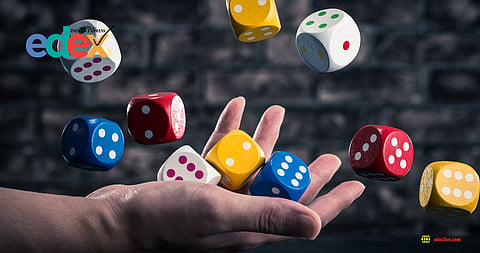

The theme of dice and gambling is a recurrent one in Indian mythology. From the ‘Gambler’s Lament’ in the Rig Veda, a great deal of literature is devoted to the dice game — most famously, the Mahabharata’s dice game that led to the Kurukshetra war. However, while the dice game between the Pandavas and Kauravas had far-reaching consequences, affecting numerous kingdoms and rules, the story of Nala and Damayanti is no less powerful.
One of the best portrayals of this story is by the prominent 16th-century poet-saint Kanakadasa from Karnataka, who emerged as one of the foremost voices of the Haridasa movement — composing devotional songs in simple Kannada and creating literary classics that blend deep philosophy with social commentary.
One of Kanakadasa’s major works was Nalacharitre (The Story of Nala), based on the famous love story of Nala and Damayanti. In this poem, Kanakadasa includes the game of dice central to Nala’s tale and imbues it with moral significance. Nalacharitre narrates how King Nala, after winning Damayanti’s hand in marriage, loses all his wealth and kingdom in a high-stakes dice game. This gambling episode, drawn from the epic, is not depicted simply as drama, but as a cautionary tale about the capricious nature of luck.
Here is a summary of the story as retold by Kanakadasa: Under Kali’s influence, Nala accepted the gamble against his better sense. He heaped up his gold and gems as wagers upon the board and cast the carven dice, unaware they were weighted by doom. With the first throw, Nala lost a cache of his treasury’s gold; with the next, his swiftest horses and mighty elephants changed hands. Throw after throw, Pushkara’s heap of riches grew taller, while Nala’s wealth dwindled like water leaking from a cracked pot.
Seeing disaster unfold, his courtiers and Queen Damayanti implored him: “Stop, my lord! This path leads only to ruin!” But Nala sat transfixed, his ears shut to good counsel, silent as a stone. At length, Nala had nothing left to stake but his kingdom’s sovereignty. In despair yet resolve, he consented to wager Nishadha itself on a final cast. Pushkara eagerly accepted — the ultimate prize lay before him. The ivory dice tumbled and sealed their verdict: Nala had lost all.
In the epic, the demon Kali Purusha, who represents Adharma (unrighteousness), is the malevolent agent who incites the disastrous dice game. In the original legend, Kali had made a pact to rig the game. Thus, “weighed by doom” isn’t mere poetry – the dice are literally cursed to ensure Nala’s loss. Kanakadasa highlights that Nala, blinded by fate, had no idea the game was unwinnable. This story serves as a true reminder that luck cannot be controlled, the throw of the dice cannot be controlled, and the future cannot be controlled.
(Written by Vinita Sidhartha of The New Indian Express)
